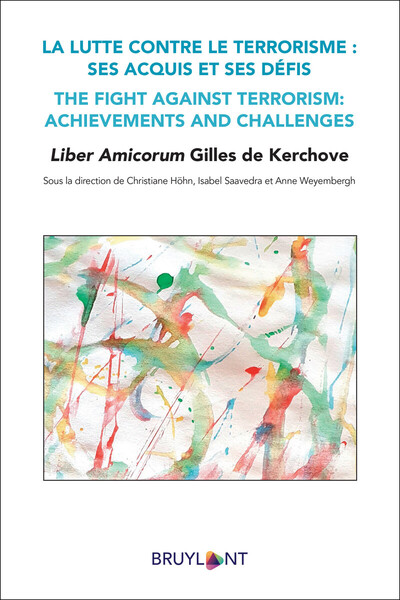- EAN13
- 9782802768890
- Éditeur
- Bruylant Edition
- Date de publication
- 25 juin 2021
- Collection
- MELANGES
- Nombre de pages
- 1086
- Dimensions
- 24,1 x 16,1 x 5,3 cm
- Poids
- 1670 g
- Langue
- fre
- Langue originale
- fre
La Lutte Contre Le Terrorisme : Ses Acquis Et Ses Défis / The Fight Against Terrorism: ..., Liber Amicorum Gilles De Kerchove
Christiane Höhn, Anne Weyembergh, Isabel Saavedra
Bruylant Edition
Prix public : 192,00 €
Ce Liber Amicorum, qui rend hommage à Gilles de Kerchove, coordinateur de l’Union européenne pour la lutte contre le terrorisme de 2007 à 2021, dresse le bilan de ce qui a été mené dans ce secteur ces dernières années et se penche également sur les défis à venir. Après une introduction retraçant le parcours du récipiendaire, la première partie se penche sur différents aspects de la coopération au sein de l’Union européenne, allant du mandat d’arrêt européen, à la protection des droits fondamentaux en passant par le rôle de certaines institutions ou agences de l’UE. La deuxième partie traite de la coopération entre l’UE et le reste du monde, qu’il s’agisse d’organisations mondiales ou de certains États en particulier, comme les États-Unis. La troisième partie, plus transversale, rassemble des contributions diverses touchant notamment à l’État islamique, au financement du terrorisme, aux victimes et aux nouvelles technologies. L’ouvrage se clôt par une quatrième partie relative à la prévention, à la lutte contre la radicalisation, aux valeurs, à la liberté de la presse et à la littérature. Les auteurs, issus de diverses parties du monde, présentent des profils très divers, parmi lesquels d’éminentes figures politiques, des fonctionnaires européens, des académiques, des magistrats et des journalistes. L’ouvrage a été coordonné par Dr. Christiane Höhn, Conseillère principale de Gilles de Kerchove, Isabel Saavedra, son Assistante personnelle et Prof. Anne Weyembergh, Professeur ordinaire à l’Université libre de Bruxelles (ULB). * * * This Liber Amicorum, which pays tribute to Gilles de Kerchove, EU counter-terrorism coordinator from 2007 to 2021, takes stock of what has been achieved in this field in recent years and looks at the challenges ahead. After an introduction tracing the recipient’s background, the first part looks at different aspects of cooperation within the European Union, ranging from the European arrest warrant, to the protection of fundamental rights and the role of certain EU institutions or agencies. The second part deals with cooperation between the EU and the rest of the world, both with global organisations and with specific States, such as the United States. The third, cross-cutting part brings together various contributions relating to the Islamic State, the financing of terrorism, victims and new technologies. The book concludes with a fourth part on prevention, the fight against radicalisation, values, freedom of the press and literature. The authors come from various parts of the world and present a wide range of profiles, including prominent political figures, EU officials, academics, magistrates and journalists. The book was coordinated by Dr. Christiane Höhn, Principal Advisor to Gilles de Kerchove, Isabel Saavedra, his Personal Assistant and Prof. Anne Weyembergh, Professor at the Université libre de Bruxelles (ULB).


















